Innovation is Dying - Its Too Hard & Expensive - Its all been Done Before
Ever since the birth of science, humans have believed that nothing is impossibleand that science and technology can always find a solution to all our problems on Planet Water (Our planet needs a name change). Even President Obama has championed the cause with the slogan: 'Yes we can!' - But can he? Can we? Has the human race lost its ability to innovate? Has invention become too hard and too expensive? Can we fix our problems?
In the past innovation was relatively easy and cheap, but as technology has advanced perhaps most of the major discoveries have already been made, especially the easy ones. What we do now are mostly embellishments, re-working old ideas (like the electric car) and trivial inventions like the iPad(?).
Does our technology have limits like Gordon E. Moore's prediction (Moore's Law) in 1970 that the number of components on integrated circuits would doubled every year "for at least ten years". There are limits to how small you can make transistors and this puts a cap on the maximum number that can be squeezed into the chip. It has been predicted that the limit will be reached by 2020.
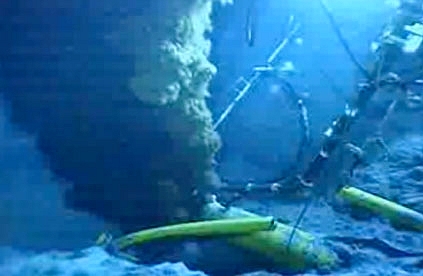


Is the claim that humans and science can always find a solution to any problem starting to wear thin in the 21st Century?
Recent events have shown that we can't fix things quickly before major damage has occurred - for example the BP oil leak in the Gulf of Mexico, Global Warming, Chernobyl and the Fukuyama nuclear disaster.
Some of the major new inventions such as Fusion Power, personal flying machines and solutions to medical problems such as AIDS and cancer are still a long way from being solved and the delivery dates keep being extended.
Why is Technology Dying? There are Several Reasons
Its Too Expensive
- NASA's budget has been cut and we cannot afford to resend men to the moon. The Mars trip keeps getting postponed.
- We can't afford to replace the space shuttle
- The costs of preparing and definding patents is too high. Have you tried to protect an invention recently? To do the basic job of protecting your invention costs over $100,000 in the US, and then there are all the international patents to prepare and lodge.
Its too Hard to Fix Things

As the search for oil and other resources extends to more difficult and extreme locations the risks increase and it becomes much harder to fix the problems. The BP oil spill in the Gulf of Mexico is a classic example.
The tragic nuclear disaster at Fukuyama has become a tragic farce. Look at the high tech solutions employed - Fire truck pumps were used to pump water into the reactors, high pressure sprays on fire trucks were used to cool the reactors down, some of the workers were exposed to radioactive water when the water leaked into their low-level boots. This is hardly a high tech fix solution from the country that is supposed to have the best nuclear safe guards on the planet.
There are many other examples of things we haven't been able to fix:
- Global Warming
- The World Obesity Epidemic
- AIDS
- World Poverty
- World Over- population
- Clean Water Supplies
- Global Pollution
- Decline of World Fish Stocks
- Soil loss and declining fertility
Its too Hard to Find to New Innovations
Science fairs are struggling and fewer students are enrolling in Science Faculties at Universities.
The decline in innovation is clearly demonstrated by the decline in the number of patent applications which have fallen steadily since the peak in 2005.
Patent Applications Peaked in 2005 and then Declined
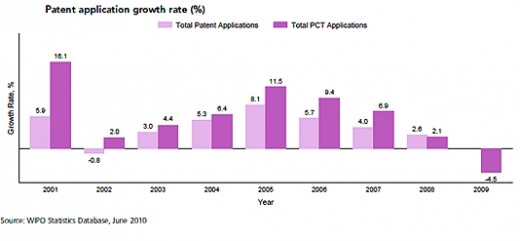
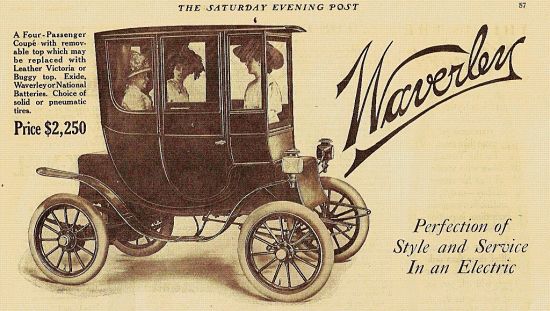
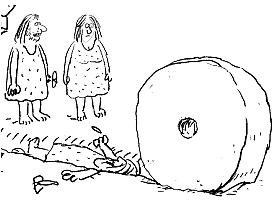
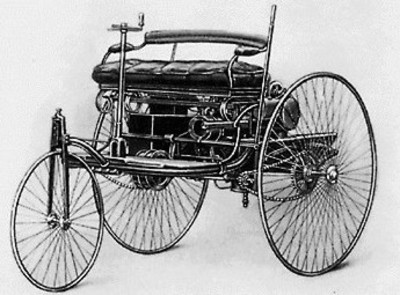
Its all been Done Before
If you look at many of the so called modern inventions you can quickly see that they are not new but old.
- Electric cars were invented in about 1835.
- The wind turbine was invented 40 years ago
- Toothbrushes have been invented thousands of years ago
- Soap was initially first used in 2800 BC in Ancient Babylon
- The Romans used central heating and irrigation systems in 1000 BC
- The leaf-springs used as suspension on many modern cars were used on carts during the horse and buggy days
The Leaf Springs on a truck in 2011 (left) are identical with those used on carts in the 1900s

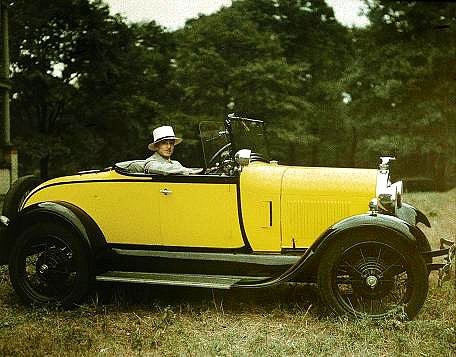

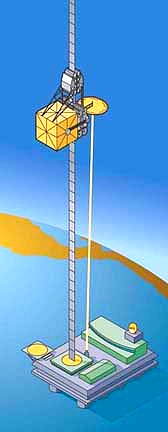

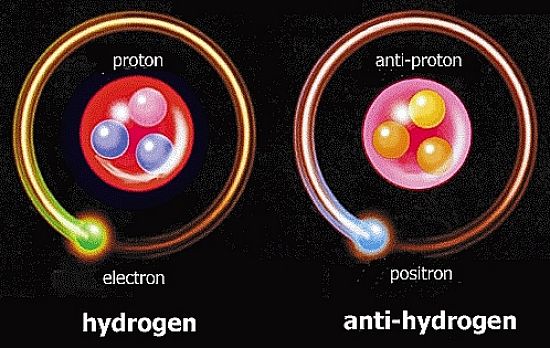
Money Stops Innovation - The Patents are Bought and Hidden Away
The classic case is cars where the major manufacturers bought all the major inventions over many years to stop their development. That is why modern cares are full on ancient technology.
Big companies such as Google buys a huge number of patents evey year and buys up fledgling companies to stop competition.
Trivia not Necessity is now the 'Mother of Invention'
The classic case is the iPad. Microsoft, Dell and HP have all claimed that it will fail, but sales are booming and there are huge waiting lists as supplies have run out.
Many modern inventions are focused on trivial items that we don't really need, while funding for the 'Necessity' items has floundered.
Brand Names and Trade Marks are not Protected in Internet Searches
Despite the numerous court cases, Google has not been forced to stop anyone from advertising items with registered brand names. This means that the buyer can not guarantee that they will get the genuine item and it promotes the fakes and clones.
The Internet has Killed Original Thought
People don't bother to try to find original solutions to their problems anymore they simply 'Google It'. This has been a major killer of innovation, particularly when the data dished up is of such varying quality.
How do you tell the crap from the good stuff? Most young people now do all their research online and most of the ideas and even the words are plagiarised. English students don't read the books for the essays anymore - they simply read the reviews on the Internet.
Newspapers with In-depth Articles and Essays are Dying
The great world newspapers such as The Times of London and The New York Times, which used to be the source of in-depth articles and analysis are dying as fewer people buy the printed versions. These newspapers are hastening their own demise by demanding that online readers pay subscriptions for the privilege. The New York Times has recently introduced subscriptions. The great newspapers will soon be dead and the future of news is the wire services, bulletins and press releases that are 'light weight' and are full of errors and biased information. This will have the effect of reducing analysis, balanced reporting and original thought about world events. News will be reduced to Google searches and news bulletins. [ by the way there is a simple way around the NY Times 20 article limit per month - they allow full views of articles found by search engines - simply Google the title and Voila! Free full articles ]
No one Takes the Time Anymore
Science has become a Down-Sized - Fast-food Enterprise. It is becoming harder and harder to get funding for long term research, especially for the pure science topics. Researchers have to focus on the quick projects that will generate a quick return. The 'publish or perish' mentality means that much of the research is shallow and lacks breadth and depth. Charles Darwin devised the theory of the Origin of the Species in 1838 and started writing his book in 1844. He was still working on it in 1858 and was only triggered into finishing and publishing it by the threat that Alfred Russel Wallace would steal his thunder. 'On the Origin of Species' was published on 24 November 1859, more than 20 years after he first thought of the idea. No one can take this amount of time any more.
Most of the major inventions that changed the world were made a long time ago (see table below)
There were few major break throughs in the 20th century and most recent inventions can be regarded as trivia (like the iPad?) rather than necessities that have changed the world.
What is the Future for the Human Race that has lost the ability to innovate and fix the real problems of the world?
Perhaps the demise of modern man's ability to innovate successfully and fix things, may be the cause of the fall of our current civilization.
Perhaps Stephen Hawking is right to suggest that the only future for the human race is in space.
When you think about it this, it is the ultimate admission that humans can't function in a sustainable way, can't fix problems and the only hope is to colonize other planets.
You can't Stop Progress!
Table 1 Major Inventions that have changed the World and Future Inventions
|
Greatest Inventions
|
Date
|
Future Inventions
|
|---|---|---|
|
The World Wide Web
|
1991
|
DNA Computer
|
|
The PET scan
|
1975
|
Fusion Power
|
|
The Laser
|
1960
|
A Colonized Moon
|
|
Transistors
|
1947
|
Stopping or Revering of Climate Change
|
|
The Computer
|
1946
|
Head Transplant
|
|
Radar
|
1935
|
Clean Cheap Energy
|
|
TV
|
1923
|
Cure for Cancer
|
|
Fax Machine
|
1913
|
Cure for AIDS and other Viruses
|
|
The Airplane
|
1903
|
Travel to Mars
|
|
Air Conditioning
|
1902
|
Space Elevator
|
|
Electric Hair Dryer
|
1902
|
Theory of Everything
|
|
Radio
|
1896
|
Nanotechnology
|
|
Motion pictures
|
1891
|
Cloned Humans
|
|
The Car
|
1885
|
Free Energy
|
|
Electric Light
|
1878
|
Universal Transporter
|
|
Telephone
|
1876
|
Replicator Technology
|
|
Anaesthetics
|
1846
|
Universal Communicator
|
|
Stethoscope
|
1816
|
The Universal Cure
|
|
The Locomotive
|
1804
|
Fountain of Youth
|
|
Vaccination
|
1796
|
Protective Force Field
|
|
Cotton Gin
|
1793
|
Flying Cars
|
|
The Steam Engine
|
1765
|
The Time Machine
|
|
Syringe
|
1646
|
Solar Reflector in Orbit
|
|
The Telescope
|
1608
|
World Peace
|
|
The Microscope
|
1590
|
A Sustainable Planet
|
|
Movable Type Printing
|
1450
|
|
|
The Mechanical Clock
|
1200
|